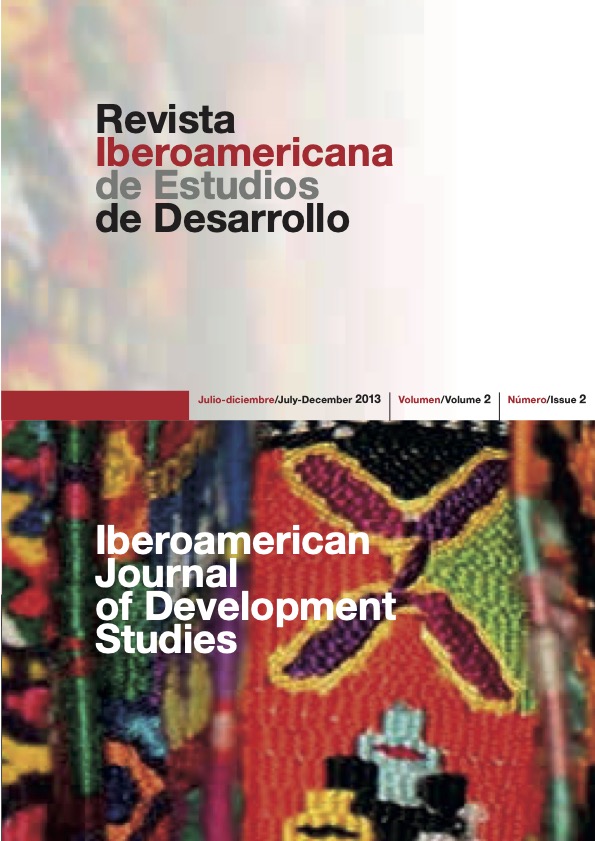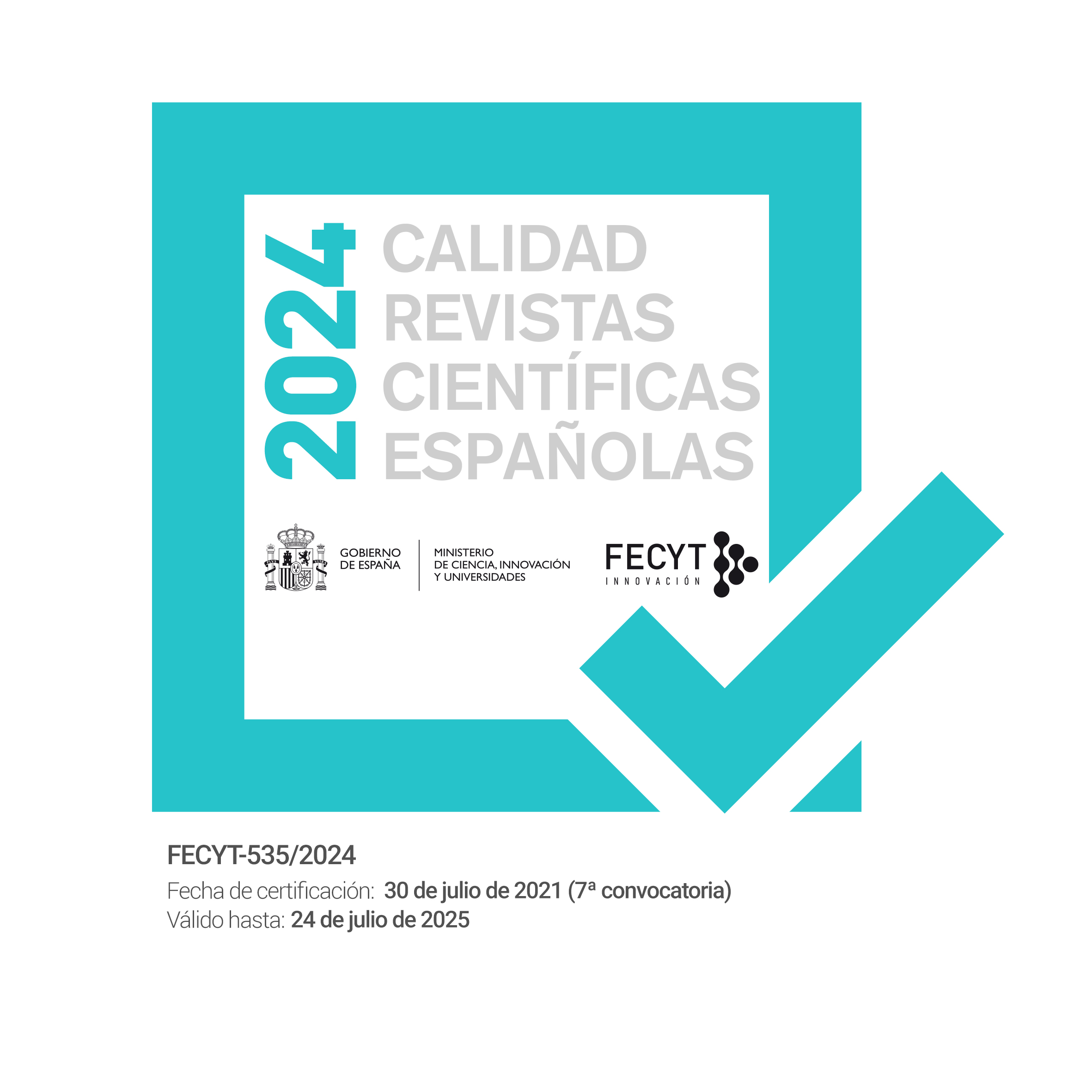Crisis, poverty and hunger. Food sovereignty as an alternative
DOI:
https://doi.org/10.26754/ojs_ried/ijds.84Keywords:
Agricultural Economy, Ecological EconomyAbstract
In this paper we analyse the causes behind the recent food crises (2008, 2011) through the study of the evolution of neo-liberal globalisation and the current world crisis. We seek the causes of hunger in factors such as the growing inequalities in income and the evolution of prices in world agricultural markets. We also analyse certain methods for measuring under-nourishment, with the aim of selecting those that we consider most coherent in order to to achieve this end, by making a number of critical observations on the subject. In accordance with various widely proven theories, we hold that food crises occur as a consequence of structural lack of the right to access to food, and not as a result of a non existent food shortage. In this context, we examine the alternative possibilities currently offered by food sovereignty, a concept that originates in international social movements and which has been found in the daily life of various rural areas, and is, at the same time, consistent with several critical theories originating from the academic world.
CITE AS:
Hidalog-Moratal, M. (2013). Crisis, pobreza y hambre. La soberanía alimentaria como alternativa. Iberoamerican Journal of Development Studies, 2 (2): 4-37
Downloads
References
AHMED E, HILLS J, SEN A (1991). Social Security in Developing Countries. Oxford University Press, Oxford
ALLEN T, THOMAS A (2000). Poverty and Development into the 21st Century. Oxford University Press, Oxford
BERRY A (2003). Policy Response to Poverty and Inequality in the Developing World: Where Should the Priorities Lie? Cepal Review 79:67-110
BERZOSA C (2011). La decadencia de la economía mundial. Nueva Tribuna, 31 de enero. También en http://www.attacmadrid.org/?p=3736
BOIX V (2011). Ocho mitos sobre la crisis alimentaria actual. Disponible en: http://alainet.org/active/46392
CAÑADAS E. La soberanía alimentaria en el mundo. Disponible en: http://www.ieham.org/html/docs/soberania_alimentar_curso.pdf
CHALLE E, RAGOT X (2011). Bubbles and Self-Fulfilling Crises. The B. E. Journal of Macroeconomics 11(1) (Topics):8 Disponible en http://www.bepress.com/bejm/vol11/iss1/art8
COSTANZA R (1997). The Value of the World’s Ecosystem Services and Natural Capital. Nature 387:253-260
CUÉLLAR PADILLA M, SEVILLA GUZMÁN E (2010). Aportando la construcción de la Soberanía Alimentaria desde la Agroecología. Ecología Política, 38
DALY H (1994). Los peligros del libre comercio. Investigación y Ciencia, enero de 1994:12-17
DALY H (2010). Criterios operativos para el desarrollo sostenible. Disponible en: http://www.eumed.net/cursecon/textos/Daly-criterios.htm
DE WAAL A (1990). A Re-assessment of Entitlement Theory in the Light of the Recent Famines in Africa. Development and Change 21(3):469-490
DE WAAL A (1997). Famine Crimes: Politics and the Disaster Relief in Africa. James Currey, Oxford
DESMARAIS A (2007). La vía campesina. Globalization and the Power of Peasants. Pluto Press. Popular, Madrid. Existe versión en castellano
DOYAL L, GOUGH I (1994). Teoría de las necesidades humanas. FUHEM-ICARIA
DREZE J, SEN A (1989). Hunger and Political Action. Clarendon Press, Oxford
DREZE J, SEN A (1991). Public Action for Social Security: Foundations and Strategy. In: Ahmed E, Hills J, Sen, A (1991). Social Security in Developing Countries. Oxford University Press, Oxford
DUCH, G (2011). Lo que hay que tragar. Minienciclopedia de política y alimentación. Los libros del Lince, Madrid
FAO (1996). Cumbre mundial sobre la alimentación. Disponible en: http://www.fao.org/wfs/index_es.htm
FMI (2008). El FMI colabora con los países para actuar ante la crisis del precio de los alimentos. Boletín FMI en línea, 3 de junio. Disponible en: https://www.imf.org/external/spanish/pubs/ft/survey/so/2008/new060308as.pdf
FORO MUNDIAL para la Soberanía Alimentaria (2007). Declaración de Nyéléni. Disponible en: http://www.nyeleni.org/spip.php?article291
FORO DE LAS ONG/OSC para la Soberanía Alimentaria (2002). Soberanía alimentaria: un derecho para todos. Declaración política del Forum de ONG/OSC para la Soberanía Alimentaria. Roma. Disponible en: http://www.foodfirst.org
GARCÍA DE LA CRUZ M, DURÁN G, SÁNCHEZ A (2011). La economía mundial en transformación.Paraninfo
GARDNER B (2007). Fuel Ethanol Subsidies and Farm Price Support. Journal of Agricultural and Food Industrial Organization 5(2),art. 4. Disponible en: http://www.bepress.com/jafio/vol5/iss2/art4
GASCÓN J, MONTAGUT, X (coords.) (2010). ¿Cambio de rumbo en las políticas agrarias latinoamericanas? Icaria
GOUGH I (2008). El enfoque de las capacidades de M. Nussbaum: un análisis comparado con nuestra teoría de las necesidades humanas. Papeles de relaciones ecosociales y cambio global 100:177-204. Disponible en http://www.otrodesarrollo.com/desarrollohumano/GoughEnfoqueCapacidadesNusbaum.pdf
HAMILTON C (2006). El fetiche del crecimiento. Laetoli
HIDALGO M (2006). Economía, pobreza y participación social en comunidades andinas: estudio de caso y aportaciones teóricas. Portularia, revista de Trabajo Social, mayo
HIDALGO M (2013). Desigualdades y gran recesión. Una propuesta sincrética entre neomarxismo, postkeynesianismo y ecologismo. XV Reunión de Economía Mundial, Santander 2013. Disponible en: http://www.sem-wes.org
JARAUTA S (2009). Coping, Adapting and Resisting: A Critical Analysis of Risk Management during Armed Conflicts. Tesis doctoral, Universidad de Alicante. Disponible en: http://rua.ua.es/dspace/handle/10045/13429
KIMRELL A (comp.) (2005). Fatal Harvest: The Tragedy of Industrial Agriculture. Island Press, Chicago
KRUGMAN P (2012). ¡Acabad ya con esta crisis! Crítica
LAPAVITSAS C (2009). El capitalismo financiarizado. Expansión y crisis. Maia
LAVOIE M (2005). La economía postkeynesiana. Un antídoto del pensamiento único. Icaria Antrazyt Economía
MARTÍNEZ ALIER J (2008). La crisis económica vista desde la economía ecológica. Ecología Política 36. También en http://www.ecologiapolitica.info/ep/36.pdf
MARTÍNEZ PEINADO J, SÁNCHEZ TABARÉS R (2009). Los niveles de análisis de la crisis actual: del economicismo al holismo sistémico. XI Reunión de Economía Mundial, Huelva. Véase web de la Sociedad de Economía Mundial
MILANOVIC B (2003). The Two Faces of Globalization: Against Globalization as We Know It. World Development 31(4):667-683
MILANOVIC B (2009). Global inequality recalculated: The effect of new 2005 PPP estimates on global inequality. Banco Mundial. Disponible en: http://siteresources.worldbank.org/INTDECINEQ/Resources/Global_Inequality_Recalculated.pdf
MOORE F, COLLINS J, ROSSET P (2005). Doce mitos sobre el hambre. Un enfoque esperanzador para la agricultura y la alimentación del siglo xxi. Icaria, Barcelona. Breve resumen en: http://www.edualter.org/material/sobirania/enlace2.pdf
NACIONES UNIDAS (2010 a). Objetivos de desarrollo del milenio. Informe 2010. Disponible en: http://www.un.org/spanish/millenniumgoals/
NACIONES UNIDAS (2010 b). Índice de pobreza multidimensional. Disponible en: http://hdr.undp.org/es/estadisticas/ipm/
NAVARRO V (2007). Neoliberalism Globalization and Inequalities. Baywood Publishing Company, Inc.
OLIVIÉ I (2004). Evolución reciente de la pobreza en el mundo: ¿qué nos dicen los datos? Real Instituto Elcano de Estudios Internacionales, Área Cooperación y Desarrollo, ARI 184
OPHDI (2011). Oxford Poverty and Human Development Initiative. Disponible en: http://www.ophi.org.uk/
PAREDES C (2002). La autoridad manda obedeciendo las decisiones del pueblo. Limatambo (Perú). Pueblos, 4 de diciembre, Madrid
PAREDES C (2004). Lineamientos para el desarrollo del mercado interno en base al progreso de la pequeña producción campesina, con democracia participativa. Instituto para una Alternativa Agraria, Mimeo, Cusco, Perú
PÉREZ DE ARMIÑO K (2011). Crisis alimentaria y lucha contra el hambre en el África subsahariana. La cuestionable contribución de los ODM. Revista de Economía Mundial (27):117-148
PNUD (2011). Índice de pobreza multidimensional. Informe sobre Desarrollo Humano 2010. Disponible en: http://hdr.undp.org/en/media/FAQs_MPI_ES.pdf . El origen académico de la propuesta y sus consiguientes detalles pueden encontrarse en OPHI
ROBERTS P (2008). The End of Food. Houghton Mifflin, Bloomsbury. Edición en castellano: (2009). El hambre que viene. Ediciones B (original en inglés titulado: The End of Food)
ROBIN M (2008). El mundo según Monsanto. De la dioxina a los OGM. Una multinacional que desea lo mejor. Península
ROEMER J (1996). Theories of Distributive Justice. Harvard University Press
ROSSET P (2004). Soberanía alimentaria: reclamo mundial del movimiento campesino.Disponible en: http://www.soberaniaalimentaria.com/textos/RossetSoberaniaAlimentariaReclamo04.pdf
ROSSET P, ÁVILA DR (2010). Causas de la crisis global de los precios de los alimentos y la respuesta campesina. Ecología Política 36:18-22
RUSSI D (2008). Los biocombustibles: ¿una solución para muchos problemas o muchos problemas sin solución? Ecología Política 34
SACHS J (2005). El fin de la pobreza: cómo conseguirlo en nuestro tiempo. Debate SACHS J (2009). Oportunidad para el pequeño agricultor. El País, 23 de agosto de 2009.Disponible en: http://elpais.com/diario/2009/08/23/negocio/1251033267_850215.html
SACHS J, UN (2011). The Millenium Villages Project. Disponible en: http://www.millenniumvillages.org/
SÁNCHEZ DÍEZ A, VIVERO JL (2011). La alimentación. Avanzar hacia la soberanía alimentaria. En: García de la Cruz (2011), 5, pp. 139-180
SANTIBÁÑEZ SERVAT C, SÁNCHEZ DÍEZ A (2011). La universalización de la pobreza. En: García de la Cruz (2011), 3, pp. 67-106
SEN A (1981). Poverty and Famines: An Essay on Entitlement and Deprivation. Oxford University Press, Oxford
SEN A (1999). La democracia y la libertad son buenas para la economía. El País, 16 de octubre de 1998
SEN A (2000). Desarrollo y libertad. Planeta, Barcelona
SOLT F (2009). Standardizing the World Income Inequality Database. Social Science Quarterly 90(2):231-242. Disponible en: http://hdl.handle.net/1902.1/11992 V4 [Versión]
STERN, N (2006). Stern Review Report on the Economics of Climate Change. Disponible en http://www.hm-treasury.gov.uk/independent_reviews/stern_review_economics_climate_change/stern_review_report.cfm
STREETEN P (1986). Lo primero es lo primero. Satisfacer las necesidades humanas básicas en los países en desarrollo. Tecnos
SUTCLIFFE B (1995). Desarrollo frente a ecología. Ecología Política 9:27-48
TORRES J, GARZÓN A (2010). La crisis de las hipotecas basura. ¿Por qué se cayó todo y no se ha hundido nada? Sequitur. Disponible en http://www.attac.es/
VÍA CAMPESINA (2010). Soberanía alimentaria y comercio. Vía Campesina exige a la ONU apoyar las verdaderas soluciones en la crisis alimentaria. Disponible en: http://www.viacampesina.org/sp/index.php?option=com_content&view=category&layout=blog&id=21&Itemid=38
VV AA (2010). La agricultura del siglo xxi. Ecología Política, 38
VV AA (2010). Hacia una nueva gobernanza de la seguridad alimentaria. Instituto de Estudios del Hambre, Campaña: Derecho a la alimentación. Urgente
VV AA (2011). Es hora de prohibir el acaparamiento de tierras, no de darle una fachada de responsabilidad. Disponible en: http://www.movimientos.org/show_text.php3?key=19220
VV AA (2012). Los límites del crecimiento: crisis energética y cambio climático. Mientras tanto. Icaria, Barcelona
WACKERNAGEL M, REES WE (1996). Our Ecological Footprint. Reducing Humen Impact on the Earth. New Society Publishers
WADE RH (2004). Is globalization Reducing Poverty and Inequality? World Development 32(4):567-589
WILKINSON R, PICKET K (2009). Desigualdad. Un análisis de la (in)felicidad colectiva.Turner Publicaciones
WITTMAN H, DESMARAIS A, WIEBE, N (eds.) (2010). Food Sovereignity. Reconnecting Food, Natura and Community. Fernwood Publishing
Downloads
Published
How to Cite
Issue
Section
License
Copyright (c) 2013 Moisés Hidalgo-Moratal

This work is licensed under a Creative Commons Attribution-NonCommercial-NoDerivatives 4.0 International License.








